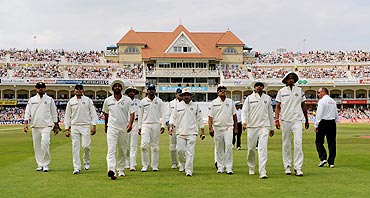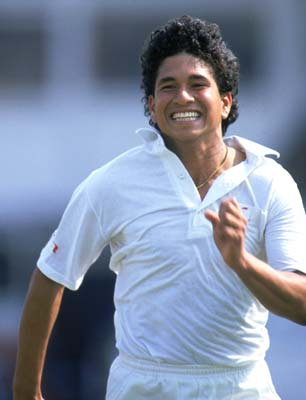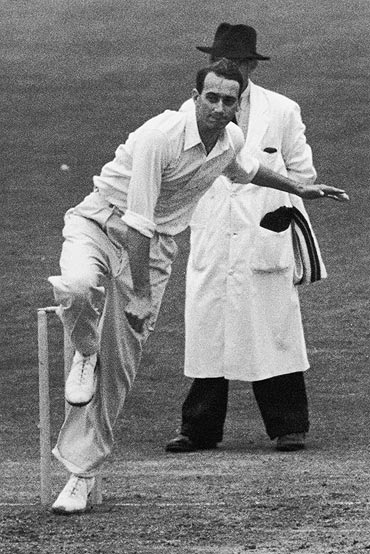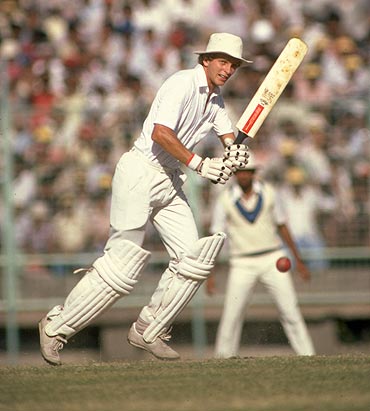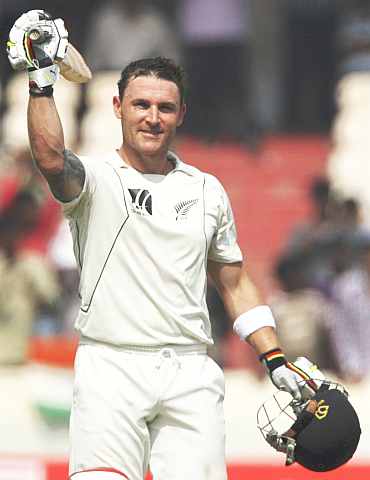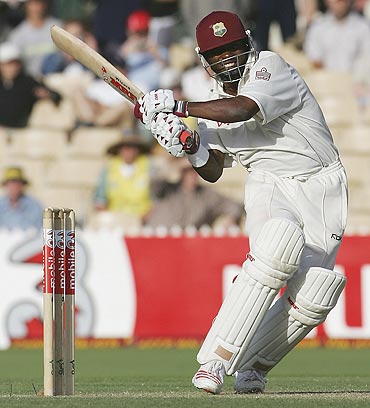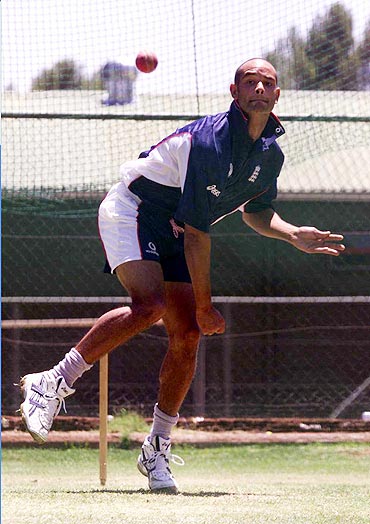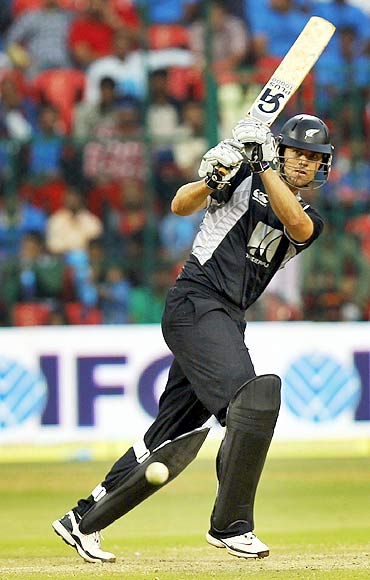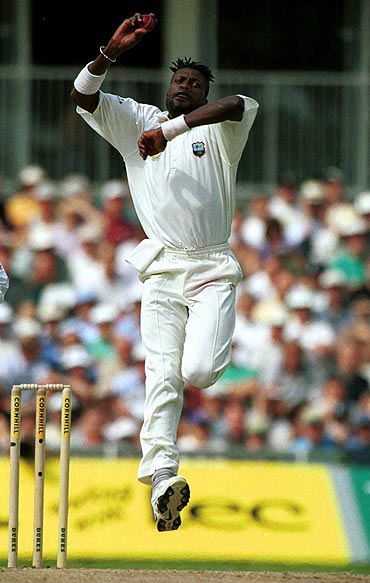 | « Back to article | Print this article |
Expert replies: Has any side drawn a four-Test series after trailing 0-2?
Rediff's resident expert Rajneesh Gupta replies to questions from readers.
If you have a question relating to cricket and did not know who to ask, bounce them off to Rajneesh. Each week he will pick questions readers send him and provide answers. Your queries should be addressed to: Ask Rajneesh on Facebook or askrajneesh@rediffmail.com
Has any side drawn a four-match Test series after trailing 0-2, as is the case with India? - Neeraj Shukla
There have been three instances where a side managed to draw a series after being 0-2 down in the series.
South Africa v England in 1927-28 (in South Africa)
England v West Indies in 1953-54 (in West Indies)
South Africa v England in 1956-57 (in South Africa)
However, all the abovementioned instances came in a five-match series. No side has ever drawn a four-match series from a position of 0-2.
So, if India manage to end the series against England 2-2, they will be the first side in Test annals to draw a four-match series after trailing 0-2.
India-SL match in 1990 didn't have all the important details
The details you gave in the last column about the scoring system in an international game were very informative. I was wondering what is the most recent Test for which we don't have the essential details like minutes batted, balls faced by batsmen etc? - Adil Naqvi
The most recent Test for which we don't have the complete details is the India-Sri Lanka match at Chandigarh in November 1990. It was Sachin Tendulkar's first home Test.
For some inexplicable reason, the details of balls faced, boundaries hit by each batsman are not available. This is why we don't know for sure the number of balls faced and number of boundaries hit in his Test career by Tendulkar (and other players appearing in this match). We can only guess about this. I would welcome if someone can help with his notes or has newspaper reports of this match.
South Africa's Tayfield holds record for longest spell without giving a single run
Who holds the world record of bowling the longest spell without conceding a single run in Test cricket? - Avtar Sethi
South Africa's Hugh Tayfield holds the record of bowling the longest run-less spells in Test cricket, which is also the record for all first-class cricket -- when he bowled 137 dot balls, including 16 consecutive 8-ball maiden overs, spread over three separate spells of bowling against England at Durban in 1956-57.
Tayfield's record performance was not all achieved in the same innings though: the first 119 balls were in England's first innings, and remaining 18 in the second innings.
Tayfield began his record sequence with his last 1.7 overs of one spell, which he followed later in the first innings with a spell of 13-13-0-1 -- the wicket being that of Peter May, although most of this spell was bowled to Trevor Bailey and Doug Insole. He did not bowl in the latter part of England's first innings, but began his bowling in the second innings with 2.2 run-less overs before Peter Richardson finally broke the drought by hitting for a 2 (and a further single later in the same over).
Tayfield's full first-innings analysis was 24-17-21-1 as England laboured to 218 off 94.3 eight-ball overs -- equivalent to 1.73 runs per six-ball over.
Gower has played most consecutive Test innings without scoring a duck
Who holds the record for playing maximum consecutive innings in Tests and ODIs, without scoring a duck? Who holds the same record for India? - Saurabh Agrawal, on Facebook
England's David Gower played 119 consecutive Test innings between August 1982 and December 1990 without getting dismissed for a duck. West Indies' Richie Richardson (96), Australia's Allan Border (89), England's Alec Stewart (86), Ken Barrington (78), South Africa's AB de Villiers (78) and Sri Lanka's Aravinda de Silva (75) are the other batsmen in this list. The Indian record is held by Rahul Dravid, who played 72 consecutive innings between February 2000 and April 2004 without a duck.
Dravid is the one who holds the corresponding record in One-Day Internationals. Between August 1999 and February 2004 Dravid played 120 consecutive duckless innings and managed to take the record from New Zealand's Martin Crowe, who had a sequence of 119 consecutive innings between February 1984 and March 1993.
However, all abovementioned batsmen registered at least a duck at some point of their career. The record of playing maximum innings without getting dismissed for a duck in Tests is held by New Zealand's Ross Taylor, who has not yet recorded a duck despite playing 55 innings.
Australia's Jim Burke holds the record for a batsman who has completed his career. Burke was never out without scoring in any of his 44 Test innings.
South Africa's Kepler Wessels holds the ODI record of longest career without registering a duck. He played 105 innings for two countries -- Australia and South Africa -- without getting out for a duck even once!
Only India and Zimbabwe have been dismissed twice in one day in a Test
Is there any instance of a side getting dismissed twice in a single day in Test cricket? - Shashank Jain
There are actually two such instances in Tests. The first side to endure this humiliation was India, against England at Manchester in 1952. It was the third day of the Test. England resumed their first innings at 292 for seven, and declared at 347 for nine. India were bowled out for 58 in just 21.4 overs, as Fred Trueman ran through the famed batting line-up with figures of 8 for 31.
Following on, India were bowled out for 82 in their second innings. The innings lasted 36.3 overs this time around, with Alec Bedser (5-27) and Gary Lock (4-36) being wreckers-in-chief.
Zimbabwe was the second team to suffer this fate, in 2005. Playing against New Zealand at Harare, Zimbabwe lost the Test in two days, that too after reducing New Zealand to 113 for five in the first innings. New Zealand ended Day 1 on 452 for nine, thanks to centuries by Brendan McCullum and Daniel Vettori.
On the second day, Zimbabwe started their first innings after New Zealand declared at their overnight score. The innings folded for 59 four overs after lunch. The follow-on was a little better, as the last eight wickets tumbled for 62 after tea, the innings folding at 99.
Lara holds record (in Tests) of registering 28 runs from boundaries in a single over
I was there at the ground when Chris Gayle hit 36 runs off one over for Royal Challenger Bangalore against Kochi Tuskers Kerala in IPL 4, all the runs coming in 6s and 4s. I wonder who holds the record of scoring most runs in one over in boundaries only, in all major forms of cricket. - MG Raghunath
Chris Gayle chose Prasanth Parameswaran for special treatment in that match, carting him for four sixes and three fours in a single over. The over actually cost Parameswaran 37 runs, as second ball of his over was a no-ball, which was also hit for a six by Gayle.
The details of most runs scored in one over in boundaries only in all major forms of cricket are as under:
Twenty20 internationals:
36 (6,6,6,6,6,6) by Yuvraj Singh off Stuart Broad for India v England at Durban in 2007-08.
One-Day Internationals:
36 (6,6,6,6,6,6) by Herschelle Gibbs off DLS van Bunge for South Africa v Netherlands at St.Kitts in 2006-07.
Test cricket:
28 (4,6,6,4,4,4) by Brian Lara off Robin Peterson for West Indies v South Africa at Johannesburg in 2003-04.
First-class matches:
36 (6,6,6,6,6,6) by Gary Sobers off Malcolm Nash for Nottinghamshire v Glamorgan at Swansea in 1968;
36 (6,6,6,6,6,6) by Ravi Shastri off Tilak Raj for Mumbai v Baroda at Mumbai in 1984-85.
Dean Headley and Bazid Khan are only two third generation players to play Test cricket
Is there a third-generation player in Test cricket? I mean, has it happened that a player played Test cricket, his father was also a Test cricketer and his father's father was also a Test cricketer? - Ashutosh Malhotra
This has actually happened twice. The first was Dean Headley, who played 15 Tests for England, between 1997 and 1999.
His father Ron and grandfather George appeared in 2 and 22 Tests respectively for the West Indies.
Pakistan's Bazid Khan became the second third-generation player in 2005 when he played against the West Indies at Bridgetown. His father Majid appeared in 63 Tests for Pakistan, while his grandfather Jahangir Khan played 4 Tests for India before partition.
Franklin is one of the five players to have 98 as their highest score in ODIs
In the last column you mentioned players with highest scores of 99, 199 & 299 in Test cricket. Does anyone have the 99 as his highest score in One-Day Internationals or Twenty20 Internationals? - Achint Parelkar
No one has quite managed 99 as his highest score either in One-Day Internationals or Twenty20 Internationals. The closest one has come without reaching 100 is 98, recorded by five batsmen -- Australia's Kim Hughes, Pakistan's Zahid Fazal, New Zealand's James Franklin, Kenya's Collins Obuya and Bangladesh's Mushfiqur Rahim.
Franklin and Obuya remained unbeaten on 98, whereas Zahid Fazal had to retire hurt.
In Twenty20 Internationals also, the highest individual such score is 98 (unbeaten) by Australia's Ricky Ponting, against New Zealand at Auckland in 2004-05. This was in the very first Twenty20 International.
Ambrose has bowled longest over in Test cricket
Who holds the record of bowling the longest over in international cricket? - Ruchi Juneja
The longest over in Test cricket is believed to be Curtly Ambrose's 15-ball over against Australia at Perth in 1996-97. It was Ambrose's ninth over on the last day of the Test and included nine no-balls. Ambrose needed 12 minutes to complete the over.
The corresponding ODI record is in the name of Pakistan's Mohammad Sami, who bowled a 17-ball over in an Asia Cup match against Bangladesh in 2004. Sami bowled seven wides and four no-balls in his second over after bowling a wicket-maiden first over.
The sequence was: wd-4-2-nb-wd-nb+1-0-wd-wd-0-wd-nb-wd-wd-nb-0-4.
